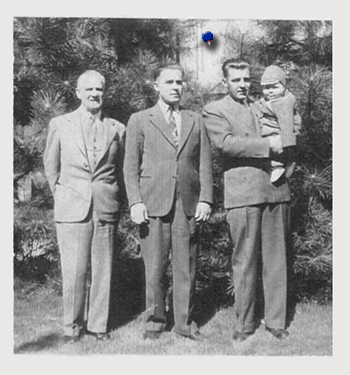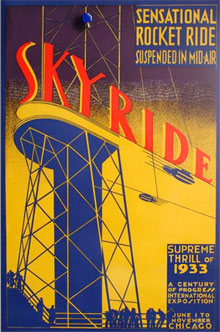Petelle Motors.
Hupmobile.
Banking on his successes Walter founded Petelle Motor Sales at 5250 Broadway early in 1930 featuring the Hupmobile. The move was ill-timed. A few months before, on October 29, 1929, later styled as "Black Tuesday," the US stock market crashed.

Founded in 1909 by two men who formerly worked for Oldsmobile, the four-cylinder vehicle had limited power, but promised high quality workmanship. In the 1920's it provided stiff competition for Ford and Chevrolet.
A fateful decision by most auto manufacturers was made in 1925 to target the higher end market - the country was experiencing an economic boom. Hupmobile began marketing an 8-cylinder car. However, the company's low production capacity meant for a slow delivery time to the customer. In its favor innovative features like "Evanair-Conditioner," car heaters that let in fresh air, were popular and were later adopted by other automakers.
The manufacturer sought dealers to market the luxury cars and Walter, experienced and successful, fit the bill.
Almost immediately he had to swim against the riptide of the Great Depression. It dragged the world down over the course of the decade as the world's gross domestic product (GDP) fell by 15%. Unemployment in the US rose to 23%, halting construction. Farmers were dealt another cruel blow as hot winds whipped through the Midwest. The so-called Dust Bowl blew away the soil in the high plains, sending as much as 12 million pounds of dirt and dust into Chicago.
As if that wasn't enough the Petelle family suffered a personal tragedy: In 1932 Walter's cousin Frank Gervais was mistaken for a deer and accidently shot to death outside his farm in Asheville.
A Family to Support.
While there were those men who abandoned their families in despair, Walter knuckled down. The dealership closed but he kept the spare auto parts. His family, and the Tony Hansen's, returned to the Hansen home at 2301 Monticello Avenue. With the Petelle's on the second floor and the Hansen's on the ground floor, it was all hands on deck.
His sons were in school for much of this period, heading off to Lane Tech. Enrollment at the all-boy Albert Grannis Lane Technical High School was over 9,000 in 1934, necessitating three shifts of classes. The boys received training in trades such as carpentry, welding and electric shop.
Marie answered the phone as customers called for parts to keep their cars running. Cousins Eddy and Betty scrambled through boxes to find what they needed. Walter spent 12 to 14 hours a day going from door to door drumming up sales and trades to keep the family afloat. Often there was little food in the house. Ed remembers his mother feeding the boys bread with a smear of lard, but swearing them to secrecy so as not to cause her husband to worry. The kids foraged in junkyards to keep their bikes running, sometimes finding other treasures like books to read.

Joseph, Walter, Wally and his son
Heartache came from all directions. Marie's mother Christine died in 1930. In 1934 Walter's mother Lula passed away; she and Joseph had been living with daughter Mabel and her family. Joseph died in 1940 and both were laid to rest in Montrose cemetery in a family plot that included Marie's parents.
But there was joy to be found: son Wally married Babe Hudetz on April 28, 1937 delivering their first grandchild in 1939.
Wally, 22, and Bob, 18, joined the Illinois National Guard in 1937 serving with the 202nd Coastal Artillery/Anti-aircraft Unit based in Chicago.
An Optimistic Spirit.
At one of the lowest points in the nation's history, the Petelle boys recalled the highs. Ed Petelle gives a lighthearted account of growing up in this period in his short memoir, All About Me.
In a happy mash-up of customs, Christmas was celebrated twice in the combined household. The Petelle's were first to see Santa, who followed traditional Danish custom and arrived on Christmas Eve. The Hansen's celebrated Christmas morning, which to youngest son Don meant double Christmas. He also fondly recalls the rice pudding his mother made.

Chicago hosted A Century of Progress International Exposition in 1933 to celebrate its centennial. The theme expanded to encompass innovation, technology, and hope against the backdrop of the Depression. The fair's unofficial motto "Science Finds, Industry Applies, Man Conforms" came from the Hall of Science exhibit. Participants were awed with the possibility of air conditioners and dishwashers in the homes of tomorrow.
Though unusual for the time, his mother drove a car. Still, ten-year-old Ed and cousin Betty hopped on to a trolley to take in the exhibits and ride the Sky Ride 190 feet above the fairgrounds. It was not their only adventure as the two youngsters regularily navigated to Chicago's movie theatres and museums on their own.
Marie played her baby grand piano as the family gathered around singing songs. On hot nights many neighbors took bedding into the parks to sleep, though Marie kept the family indoors.
Favorite radio shows included Inner Sanctum Mystery (which Ed described as "spooky"), The Green Hornet and Little Orphan Annie. The Hindenberg disaster was brought into their homes through radio as Wally, Bob and Ed listened live to the horrifying account of the dirigible bursting into flames in 1937.
- https://en.wikipedia.org/wiki/Hupmobile
- https://en.wikipedia.org/wiki/Dust_Bowl
- Petelle A Family Geneaolgy, Lynne Lorraine Petelle Johannes and Jan Johannes, 1993
- All About Me, Edward H. Petelle, 1998
- http://www.encyclopedia.chicagohistory.org/pages/225.html
